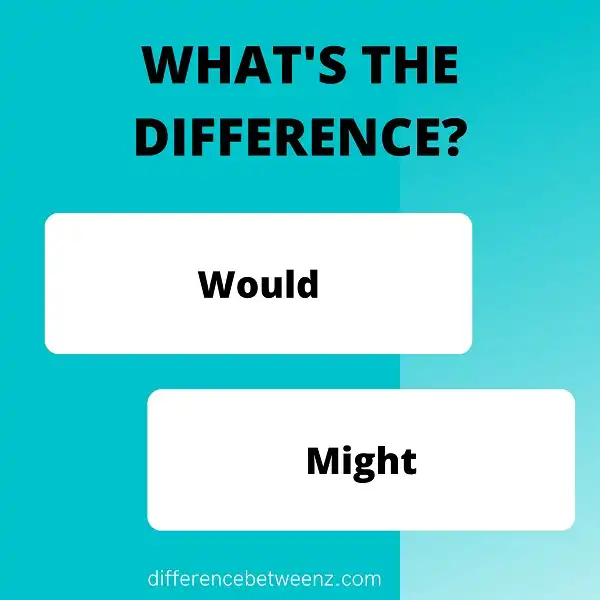Might and would are two words that are often confused. They both have different meanings, and it’s important to know the difference between them. In this blog post, we will discuss the difference between might and would, and provide examples of how each word is used.
What is Would?
Would is a modal auxiliary verb. This means that it is used to indicate possibility or potential. Would can be used to indicate future possibility, as in “I would like to go to the park tomorrow.” It can also be used to express what someone desires or wishes for, as in “I would love a cup of coffee.” Would can also be used to talk about habitual actions in the past, as in “When I was a kid, I would always go out and play with my friends.” Would can also be used to make polite requests, as in “Would you please pass the salt?” As you can see, would is a versatile verb that can be used in a variety of different ways.
What is Might?
Might is a word that is used to express possibility. For example, you might go to the park tomorrow. This means that it is possible that you will go to the park tomorrow, but you are not certain. Might can also be used to express doubt or disbelief. For example, she might be the best singer in the world. This means that you doubt that she is the best singer in the world. Might is also used to make requests. For example, Might I ask you a question? This is a polite way of asking if you can ask a question. Finally, might can be used to express ability or power. For example, he might be able to lift that heavy box. This means that he has the ability or power to lift the heavy box.
Difference between Would and Might
Would and might often express similar meanings; however, there are some important differences between these two words. Would is used to describe an action that is likely or possible, as well as to request or offer something.
- Might is used to describing an action that is less certain than would. It can also be used to express possibility or agreement. For example, if you say “I would like to go for a walk,” you are expressing a desire to go for a walk. If you say “I might go for a walk,” you are saying that it is possible that you will go for a walk. In order to choose the right word, it is important to consider the context of the situation.
- Would is generally more polite than might, so it is often the better choice when making requests. However, might can be used to express doubt or uncertainty, which would not be appropriate in these situations.
- Ultimately, the decision of which word to use depends on the meaning you wish to convey. Would and might may seem similar at first glance, but they actually express quite different concepts. Would is used to describe actions that are likely or possible, while might expresses actions that are less certain.
- Would it also generally more polite than might, so it is often the better choice when making requests. However, there are exceptions to every rule, so be sure to consider the context of the situation before choosing your word.
Conclusion
The main difference between would and might is that would indicate a certainty, while might suggests that something is possible. For example, if you say “I would like to go for coffee”, you are indicating that it is definitely something you want to do; on the other hand, if you say “I might go for coffee”, you are leaving open the possibility that something else may come up and prevent you from going. In business contexts, using would rather than might can make your requests sound more confident and likely to be granted. Might also be used when making requests of people in positions of authority – for instance, if you were asking your boss for a raise, you might use the word “might” to soften the request.


